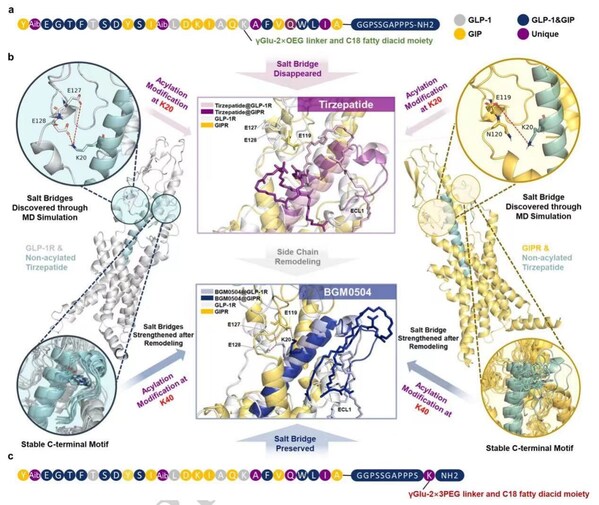Nature Study Reveals: AI and Molecular Dynamics Designed BGM0504 Exhibits Superior Potency
By PRNEWSWIREPublished : July 23, 2024 - 00:10
SHANGHAI, July 22, 2024 /PRNewswire/ -- The molecular design strategy and experimental results of Bright Gene's dual GLP-1/GIP receptor agonist, BGM0504, have been published online in Scientific Reports, a sub-journal of Nature, on July 19, 2024. Bright Gene (Stock Code: 688166.SH) is an innovative pharmaceutical company emerging on the international stage, is focused on developing best-in-class pharmaceuticals to improve patient health globally.
The article, titled "Molecular Dynamics Guided Optimization of BGM0504 Enhances Dual Target Agonism for Combating Diabetes and Obesity", presents the findings of BGM0504's development.
BGM0504, an AI-assisted designed dual GIP and GLP-1 receptor agonist, demonstrates superior efficacy in both in vitro and in vivo experiments. Using AI-driven computer simulations, Bright Gene has discovered that optimal interaction between the glutamate residues on both GLP-1R and GIPR and the K20 residue of a peptide agonist provide superior activity. This interaction is a key insight not evident in cryo-EM studies. BGM0504 was designed to preserve the free amino group of the K20 residue by shifting the acylation point to position 40 of BGM0504. This design resulted in a 3-fold increase in agonistic effects on GLP-1R and GIPR, with superior therapeutic outcomes in diabetic and obesity mouse models.
About Bright Gene and BGM0504
Bright Gene (Stock Code: 688166.SH) is an innovative pharmaceutical company focused on developing best-in-class pharmaceuticals. The company integrates APIs and formulations, combining generic and innovative drugs to meet global clinical needs. BGM0504 is a dual GIP/GLP-1 receptor agonist for treating type 2 diabetes, obesity, and NASH, currently in the late stages of Phase II clinical trials.
Reference
Yuan, J., Liu, W., Jiang, X. et al. Molecular dynamics-guided optimization of BGM0504 enhances dual-target agonism for combating diabetes and obesity. Sci Rep 14, 16680 (2024). https://doi.org/10.1038/s41598-024-66998-8




![[Herald Interview] 'Trump will use tariffs as first line of defense for American manufacturing'](http://res.heraldm.com/phpwas/restmb_idxmake.php?idx=644&simg=/content/image/2024/11/26/20241126050017_0.jpg&u=20241126161719)

![[Health and care] Getting cancer young: Why cancer isn’t just an older person’s battle](http://res.heraldm.com/phpwas/restmb_idxmake.php?idx=644&simg=/content/image/2024/11/26/20241126050043_0.jpg&u=20241126145342)


![[Graphic News] International marriages on rise in Korea](http://res.heraldm.com/phpwas/restmb_idxmake.php?idx=644&simg=/content/image/2024/11/25/20241125050091_0.gif&u=)









